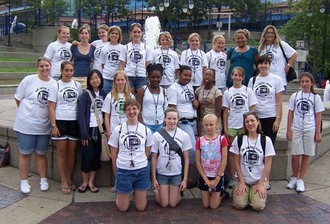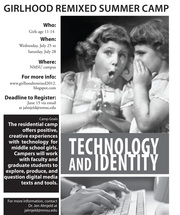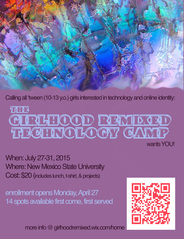Our Story

The Digital Mirror, a four-day residential summer camp for girls in grades 6-8 interested in technology, began in November 2007 with an informal meeting of a technofeminist club on Bowling Green State University's campus. The group of rhetoric, communication studies, and American culture studies faculty and grad students didn’t have an agenda at first, only a desire to do something to address the gender gap often lauded in the scholarship of all our fields. After months of planning, twenty tween girls came to campus to learn about blogging, Web design, Photoshop, and STEM careers guided by a skeleton crew of volunteers working on a shoestring budget.
That first camp became the blueprint for three subsequent camps on Bowling Green’s campus and spawned an additional two camps on opposite US coasts.
Kris Blair and Jen Almjeld were part of that first camp and continue to be thrilled and a little surprised by the impact the camp has had on generations of techno-girls. Blair describes the camp as “a chance to align theory and praxis via intergenerational and reciprocal technofeminist mentoring, to walk the talk in terms of creating interventions within inequitable systems of power that mediate women and girls’ access to and comfort with technology and reinforce cultural assumptions about technology as a male enterprise” (K. Blair, personal communication, September 4, 2015). For Blair, personal connection, both in the form of scholarly interests and interpersonal relationships, was at the heart of the success of the camp:
That first camp became the blueprint for three subsequent camps on Bowling Green’s campus and spawned an additional two camps on opposite US coasts.
Kris Blair and Jen Almjeld were part of that first camp and continue to be thrilled and a little surprised by the impact the camp has had on generations of techno-girls. Blair describes the camp as “a chance to align theory and praxis via intergenerational and reciprocal technofeminist mentoring, to walk the talk in terms of creating interventions within inequitable systems of power that mediate women and girls’ access to and comfort with technology and reinforce cultural assumptions about technology as a male enterprise” (K. Blair, personal communication, September 4, 2015). For Blair, personal connection, both in the form of scholarly interests and interpersonal relationships, was at the heart of the success of the camp:
Admittedly, I was able to realize my activist goals of a computer camp for girls only through the involvement of graduate student women as co-facilitators, who in turn mentored the adolescent girls participating. As a feminist and as a graduate educator, it was a powerful, sustainable form of community digital literacy acquisition in that these young girls were able to then mentor one another, and a number of the graduate students went on to develop their own initiatives as new faculty in both university and community-college settings. While I know the camp had a positive impact on those who participated, it became one of the most significant projects of my entire career, and I am forever grateful to the many women who helped make it possible. (K. Blair, personal communication, September 4, 2015)

As one of the graduate student women serving as a co-facilitator of that first iteration of the camp, Almjeld went on to establish her own camp at New Mexico State University in 2012. The camp, rebranded Girlhood Remixed, placed more emphasis on identity construction but retained the focus on gender constraints in online spaces. The camp was built on the best practices of the Digital Mirror while reflecting Almjeld’s scholarly interests in girlhood as a construct and identity with and through technologies. The camp ran for two summers, serving fifty girls in the Las Cruces, New Mexico, area until Almjeld moved to Virginia for a new job at James Madison University. After partnering with the Boys and Girls Club of Harrisonburg and Rockingham County in Virginia, a new iteration of the camp is planned for summer 2016 and is set to serve forty girls as part of the Young Women’s Leadership project.

Almjeld’s move was not the end of the Girlhood Remixed, however. Jen England, a graduate student now in her final year of studies at New Mexico State University served as assistant director of the 2013 Girlhood Remixed and took over leadership with her own camp in July 2015. Again, England built her Girlhood Remixed Technology Camp on the experiences of the camp before, but like Almjeld, reshaped the camp to reflect both her research interests and community's needs. England’s camp was a smaller, non-residential, week-long day camp that served fourteen girls. Reflecting her dissertation research, a hands-on workshop focused on girls and gaming was added to the camp curriculum. In addition, campers participated in a workshop about girls and advertising and two workshops on mind and body positivity. England explains this iteration of the camp focused more on process than product, both in terms of the projects girls created and the ways they learned to view themselves as young technofeminists.
The feminist mentors leading these technofeminist camps are at very different places in their careers: Blair is a full professor, former department chair, and editor of two important journals in our field. Almjeld is an assistant professor at James Madison University up for tenure this year, and England is an advanced graduate student on the job market. We share our stories to demonstrate ways this sort of outreach work may be folded into academic careers at most any stage.
We also want to provide a bit of context for our camps because they were located in three different geographic locations and served very different populations. While the three institutions supporting these projects are similarly sized public institutions – all with student populations of about 20,000 – each project reflected a different focus based on the camp director’s expertise and interests as well as an awareness of the needs of each community. The girlhood encountered in New Mexico was radically different in terms of race and geographic location than the girlhood interrogated in the original camp located in northwestern Ohio. And although Harrisonburg, VA, is a rural area nestled in the Shenandoah Valley, the proximity to Washington, DC, and northern Virginia ensures many of the camp’s volunteers will come from urban and often economically advantaged areas. We hope this multiplicity suggests to readers that this camp model is adaptable and highly responsive to context and target audience. We also note that, despite the differences in the camps and the directors, the commonalities that have made these camps sustainable is the focus on mentorship, a commitment to interrogating gender via the lens of technology, and a belief that working in and with the community is the best way to take on that interrogation.
We also want to provide a bit of context for our camps because they were located in three different geographic locations and served very different populations. While the three institutions supporting these projects are similarly sized public institutions – all with student populations of about 20,000 – each project reflected a different focus based on the camp director’s expertise and interests as well as an awareness of the needs of each community. The girlhood encountered in New Mexico was radically different in terms of race and geographic location than the girlhood interrogated in the original camp located in northwestern Ohio. And although Harrisonburg, VA, is a rural area nestled in the Shenandoah Valley, the proximity to Washington, DC, and northern Virginia ensures many of the camp’s volunteers will come from urban and often economically advantaged areas. We hope this multiplicity suggests to readers that this camp model is adaptable and highly responsive to context and target audience. We also note that, despite the differences in the camps and the directors, the commonalities that have made these camps sustainable is the focus on mentorship, a commitment to interrogating gender via the lens of technology, and a belief that working in and with the community is the best way to take on that interrogation.